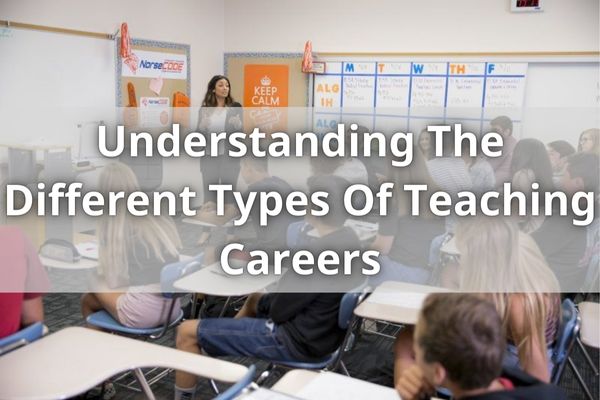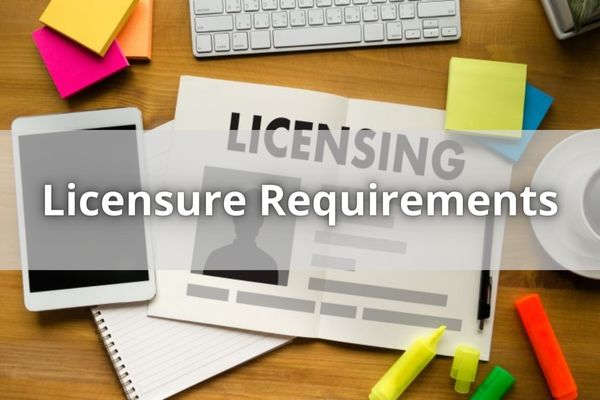Teacher Career Requirements: Key Qualifications And Skills
Becoming a teacher is an incredibly rewarding career. It requires commitment, patience and the ability to inspire students of all ages.
In order to become a successful educator, it’s important to understand the teacher career requirements for pursuing this field as a profession. This article will outline essential qualifications one must have in order to find success in their teaching career.
Understanding The Different Types Of Teaching Careers

Teaching is a rewarding and challenging career, with many different options for aspiring educators. Before deciding on a particular teaching path, it’s important to understand the various types of teaching careers available so that you can choose one that best fits your skills and interests.
Public Schools
A common type of teaching job is working in public schools. This involves providing instruction to students from kindergarten through twelfth grade in core academic subjects such as English, math, science and history. To teach at this level typically requires earning a certificate or license from the state where you plan to work.
Requirements vary by state but generally include student-teaching experience and passing an exam related to content knowledge and educational theory.
Private Schools
Working at private schools may also be an option depending on the institution’s requirements. Like public school teachers, private school instructors are responsible for instructing students in academics, but they may have more freedom when it comes to lesson planning due to fewer regulations than those governing public schools.
Private schools may require prior teaching experience; some even prefer candidates who hold advanced degrees in their subject area or education field.
Online Tutoring Services And Adult Learning Centers
In addition to traditional classroom settings, there are other opportunities within the education sector including online tutoring services and adult learning centers. Online tutors provide personalized assistance via video conference calls while adult learning centers offer classes designed specifically for adults looking to gain new skills or refresh existing ones.
For these positions, experience in the specific topic being taught is often preferred along with excellent communication abilities both verbal and written.
Educational Qualifications For Teaching
Teaching is a rewarding career, and there are many paths to take when pursuing it. While some teachers may have the same general goals in mind, specific requirements vary depending on the type of teaching position one desires. Understanding these different types of teaching careers is an important step for anyone considering entering this field.
Your educational requirements for teaching mostly rely on the type of educator you wish to be. For instance, instructors in public schools often need both a state-issued certification or license and at least a bachelor’s degree from an approved university. Private schools usually require potential educators to possess similar credentials but also often request additional certifications such as subject-specific degrees or specialized training programs.
Teaching English abroad might require only basic qualifications like TEFL (teaching English as a foreign language) certification, while international school positions can necessitate more extensive educational preparation such as advanced graduate degrees and/or experience teaching in other countries.
No matter which route you decide to take with your teaching career, having good references and letters of recommendation will prove beneficial. Demonstrating enthusiasm and commitment during job interviews could also go a long way toward landing that perfect position. Ultimately, the individual must determine their own path based on their professional goals, education level, and passion for the profession.
Professional Certifications
The professional certifications required for a teacher’s career are essential to ensure the best possible education is provided. It isn’t just about having a degree, it’s also about being certified in teaching methods and techniques so that students may have the best opportunity to learn and thrive.
Here are 4 key requirements for teachers:
- A valid teaching license from the state board of education
- Certification in special education, if needed
- Completion of courses or workshops related to classroom management and educational technology
- Training in first aid and CPR
It’s important for teachers to stay up-to-date on all of these credentials as they can help them maintain their effectiveness as educators. Furthermore, many employers mandate certain levels of certification as part of their hiring process since this helps guarantee quality instruction to students.
To be sure that you’re meeting these expectations, always remember to renew your licenses annually and keep track of any new advances in the field relevant to your specialty area.
Licensure Requirements

Teaching is a rewarding career, but it also comes with certain requirements. In order to become certified as a teacher, individuals must meet the necessary licensure standards.
The first step in becoming licensed as a teacher is passing the applicable state exams. Passing these tests ensures that teachers possess an adequate understanding of their subject matter and can effectively communicate this knowledge to students. After taking and passing these exams, aspiring teachers must complete pre-service training and other general education requirements set out by the state in which they wish to teach.
In addition to those steps listed above, most states require individuals seeking teaching certification to have completed at least one year of student teaching or supervised field experience prior to obtaining licensure. This requirement enables potential teachers to gain hands-on experiences related to their chosen profession under the guidance of experienced mentors in classroom settings before embarking on full-time teaching careers.
To summarize, prospective teachers are required to pass state exams, fulfill general educational requirements set forth by the state board of education, and obtain some form of pre-service or field experience prior to receiving licensure for teaching positions. These policies ensure that only qualified instructors enter the school system who understand their respective fields and can provide quality instruction for students in areas such as math, science, language arts, etc.
Understanding Teacher Certification Tests
Licensure is only the first step in a teacher’s career. Understanding certification tests and their importance to teaching success is key as these exams are required for attaining licensure. It is therefore important that teachers have an understanding of what they need to know so they can pass the exam, as well as how to prepare and study effectively for it.
Certification tests vary by state but should generally cover topics such as knowledge of educational theory, instructional strategies, classroom management basics, special education requirements and assessment practices. The content tested on the test reflects the standards set forth in each state’s professional regulations for educators. Knowing which topics will be covered ahead of time allows teachers to focus their studying accordingly and build confidence before taking the test.
Preparing for certification tests also involves familiarizing oneself with different types of questions that may appear on the exam, such as multiple choice or written response questions. Additionally, many states provide practice exams or other resources that help prospective candidates understand what type of material will be included on the official test day.
By utilizing all available resources beforehand, teachers can get a better idea of what they need to expect when they sit down to take their licensing examination.
Salary Expectations Of Teachers
The vocation of teaching demands commitment and diligence. In order for pupils to achieve their greatest potential, instructors must not only be informed and enthusiastic about the things they teach but also have the capacity to inspire others. This career path demands various qualifications, such as a valid teaching certificate or license and an advanced degree in education.
Furthermore, there are certain expectations when it comes to salary. Generally speaking, newly-hired teachers can expect salaries on the lower end of the spectrum. However, with experience and added credentials, these amounts will increase over time. In addition, some states offer higher compensation based on cost of living differences between metropolitan areas and rural regions.
Likewise, public school districts may have varying base wages depending on location; urban schools tend to pay more than those located in smaller towns or suburbs due to budget restrictions. Aside from general wage increases through promotions or years of service, many institutions provide bonuses for special achievements like student success or teacher recognition awards.
It’s important for educators considering this profession to research what type of financial incentives each organization offers prior to accepting a position so they know exactly what kind of remuneration they’ll receive for their efforts.
Finding The Right Teaching Position
Although it might be difficult, there are actions you can do to improve your chances of finding the ideal teaching position.
To start, it is important to understand what qualifications and expectations employers have for teachers in the modern era. Here’s a quick checklist:
- Possess at least a Bachelor’s Degree in Education or related field
- Have experience working with children of various ages
- Be knowledgeable about classroom management strategies
- Demonstrate excellent verbal and written communication skills
- Showcase strong organizational abilities
Once potential job requirements are understood, researching open positions is essential. It is also beneficial to network with other educators and create relationships within the community; this not only increases an applicant’s visibility but may lead to job opportunities as well.
Additionally, many schools post openings on their websites so it pays off to stay abreast of any changes or new postings.
Finally, when applying for jobs, make sure all materials submitted accurately reflect your strengths and skillset so that prospective employers get a clear picture of why you would be a great fit for their team.
With preparation and due diligence, finding the perfect teaching position will become much easier!
Effective Job Search Strategies

Having identified the right teaching position for you, the next step is to make sure you have the best job search strategies in place. A successful job search requires taking some time to plan and prepare.
It’s important that your resume reflects all of your qualifications and experiences as a teacher accurately and effectively. Additionally, it’s essential to research potential employers before applying, so that you can tailor your application accordingly.
Networking is also an integral part of any successful job search. Reach out to other teachers in your field or industry contacts who might be able to offer advice on how to approach a particular employer or help recommend you for open positions.
Furthermore, if there are conferences or meetings relevant to teaching available in your area, attending those events could provide valuable connections with people who may know about potential openings. When you’re ready to apply for jobs, consider setting up alerts from sites like Indeed anytime something related to teaching pops up in your area.
This will give you access to new opportunities sooner rather than later and ensure that no opportunity goes unnoticed. With these job search strategies at hand, you’ll be well-equipped for finding the perfect teaching role!
Understanding The Interview Process
Navigating the interview process can be intimidating, but with a few tips and tricks, you’ll sail through it like a pro.
- First of all, familiarize yourself with the job requirements – what skills are needed for this position? Having an understanding of these will help you to answer questions confidently during the actual interview.
- Secondly, practice your answers out loud so that you know exactly how you want to present yourself when the time comes.
- Finally, keep in mind that knowing who you’re interviewing with is key; research about the school or district before arriving at the meeting. This way, you can provide specific examples of why your experiences make you uniquely qualified for this role.
With preparation and knowledge under your belt, go into the interview feeling confident and ready to show your best self!
Preparing For A Successful Career As A Teacher

Make sure you have the necessary training and experience if you’re thinking about becoming a teacher. Having an appropriate degree or qualification in teaching can be beneficial when looking for positions at schools, colleges or universities. It is also recommended to gain some experience with mentoring young people or working with children before applying for teaching roles.
Having knowledge of current trends in the education sector is essential for successful teachers. This means staying up-to-date with changes to the curriculum, educational reforms and developments in technology which could benefit students’ learning experiences. Additionally, strong interpersonal skills are necessary for effectively managing relationships between parents and other staff members; this involves good communication and problem solving abilities.
At all stages of your teaching career, professional development opportunities should be sought out wherever possible. Regularly attending courses, seminars and conferences related to teaching will help keep abreast of new methods and techniques being used in classrooms and enable you to stay ahead of the curve when it comes to best practices.
Taking on additional responsibilities such as leading extra-curricular activities can also offer invaluable insight into how different age groups learn while furthering your own personal growth as an educator.
Conclusion
Finding a teaching job can be challenging, but with the right strategy and research it is achievable. It’s important to understand the salary expectations for beginning teachers as well as any non-traditional opportunities that may exist. Becoming certified typically takes anywhere from six months to two years depending on your program of choice, and there are online programs available if you need more flexibility.
Ultimately, becoming a teacher requires dedication and hard work but it can be an incredibly rewarding career path. With the proper preparation you’ll be ready to make a difference in students’ lives!







